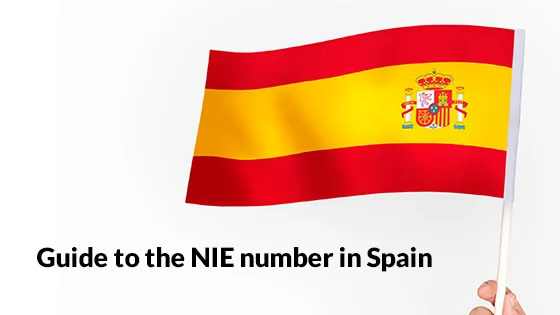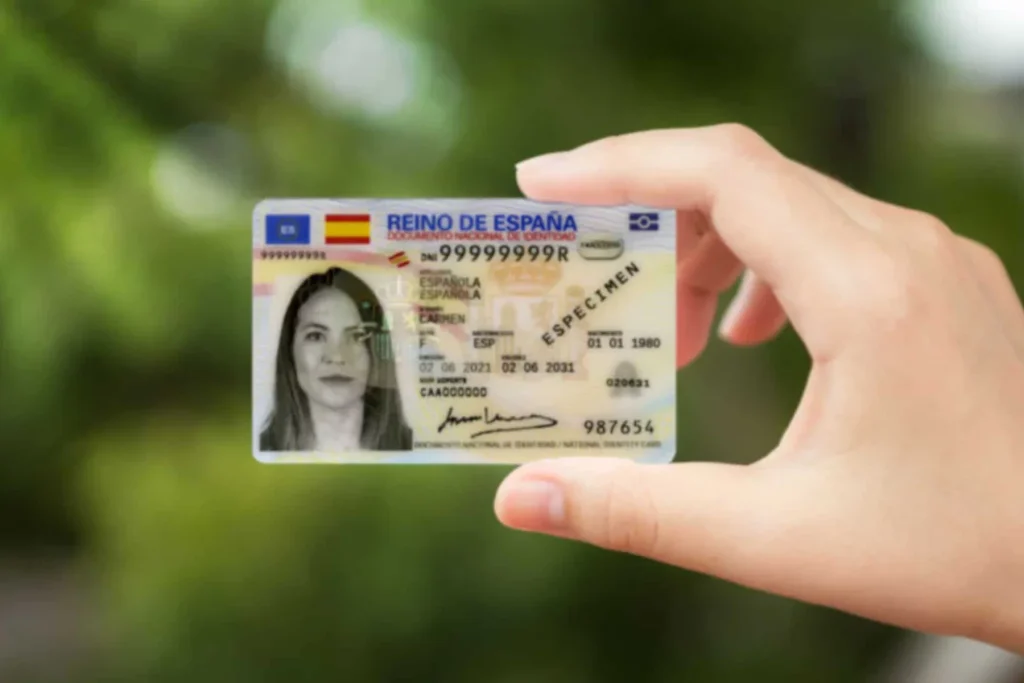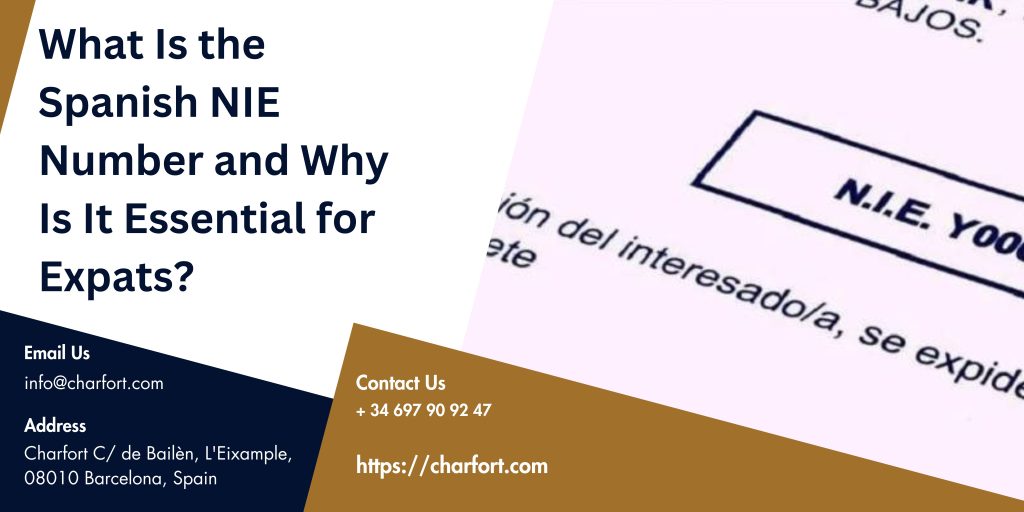
If you’re planning to live, work, or invest in Spain, you’ll need to be familiar with the Spanish NIE number. This key identifier is crucial for various activities and legal processes in Spain, but what exactly is it and why is it so important? In this blog, we’ll delve into the details of the NIE number, explain its significance, and answer some common questions to help you navigate the process with ease.
What Is the Spanish NIE Number?
The NIE (Número de Identificación de Extranjero) is a unique identification number assigned to non-Spanish citizens for legal and tax purposes in Spain. It serves as the equivalent of a Spanish citizen’s DNI (Documento Nacional de Identidad) but is specifically for foreigners. If you plan on staying in Spain for an extended period, working, purchasing property, or conducting business, obtaining an NIE is essential. Let’s break down what it is and when you’ll need it.
Purpose of the NIE Number
The NIE is primarily used to track and identify foreigners in Spain for any legal or financial transactions. Think of it as your identification for all bureaucratic processes. Whether you are applying for a residency permit, paying taxes, or opening a bank account, your NIE will be required. Essentially, it’s your all-access pass to dealing with Spanish authorities and conducting everyday activities that require official documentation.
Who Needs an NIE Number?
Almost anyone who plans to spend a significant amount of time in Spain will need an NIE. Here are the most common groups of people who require it:
- Foreigners working in Spain: If you’ve accepted a job or are running a business in Spain, you’ll need an NIE to be properly registered with the Spanish tax system.
- Property buyers: If you plan to buy property in Spain, an NIE is a must. You’ll need it for all the legal and tax paperwork related to the purchase.
- Students: If you’re a student from abroad staying in Spain for an extended period, many universities and institutions will require you to have an NIE for registration and other legal matters.
- Long-term residents: If you’re planning on staying in Spain for longer than three months, you will need to apply for an NIE to regularize your stay.
How Do You Get an NIE Number?
There are a couple of ways to obtain your NIE:
- In Spain: You can apply for your NIE at the nearest police station with a foreigner’s office (Oficina de ExtranjerÃa). You’ll need to fill out a form, provide identification like your passport, and explain the reason for your application (e.g., work, property purchase). You’ll also need to pay a small fee.
- From Abroad: If you’re not yet in Spain but need your NIE, you can apply for it through the Spanish consulate in your home country. The process can take a bit longer, but it allows you to have your NIE ready upon your arrival.
When Will You Use Your NIE Number?
Once you have your NIE, you’ll use it for a wide range of activities:
- Opening a bank account: Most Spanish banks will require an NIE before allowing you to open an account.
- Paying taxes: If you have any source of income in Spain, such as employment or rental income from property, you’ll need an NIE to pay taxes.
- Signing contracts: Whether it’s a work contract, a lease agreement, or even setting up utilities like electricity and internet, your NIE is essential.
- Healthcare: If you’re accessing the public healthcare system, your NIE will likely be needed for registration and services.
In short, the NIE number is vital for foreigners in Spain, making it possible to carry out day-to-day activities like buying property, paying taxes, and more. It’s not just an identification number—it’s your key to participating in Spain’s legal and financial systems. If you’re planning to move to Spain or stay long-term, make sure applying for an NIE is one of your first steps!
What’s the Role of the NIE in Spain?
The NIE (Número de Identificación de Extranjero) plays a crucial role for foreigners in Spain, acting as your identification number for legal, financial, and administrative processes. Whether you’re planning to work, buy property, or stay for an extended period, the NIE becomes essential for navigating daily life in Spain. Let’s dive into the specific roles it plays in different aspects of living and conducting business in the country.

Legal Identification for Foreigners
The NIE serves as a foreigner’s official ID number in Spain. Much like Spanish citizens use their DNI (Documento Nacional de Identidad), non-citizens need the NIE for identification in all legal situations. From signing contracts to interacting with government agencies, the NIE identifies you within the Spanish system. It is tied to any legal documents you might handle during your stay, making it a central part of your legal identity in Spain.
Required for Employment and Business
Planning to work in Spain? You’ll need an NIE to officially join the workforce. Employers in Spain are required to register their employees for tax and social security purposes, and this process involves your NIE. Without it, you won’t be able to work legally in the country.
The same goes for running a business. Whether you’re setting up a company or working as a freelancer, the NIE is a mandatory requirement for registration with the Spanish tax authorities. Essentially, it’s your ticket to legally working and doing business in Spain.
Purchasing Property and Signing Contracts
If you’re thinking of buying property in Spain, the NIE is essential. It will be required during the entire process, from signing the purchase contract to paying taxes on the property. The same applies when you’re renting an apartment or buying a car—your NIE will be requested in these and other legal transactions.
When you sign any contract in Spain, such as a lease or utility agreement, the NIE acts as your identification, ensuring that everything is legally binding and properly documented in your name.
Necessary for Opening a Bank Account
Most Spanish banks require you to provide an NIE when opening an account. While some banks may allow non-residents to open accounts with just a passport, having an NIE simplifies the process and allows you access to resident accounts, which often have more favorable terms. If you plan to live in Spain for a longer period, it’s practically impossible to function financially without an NIE.
Tax Obligations and Social Security
For tax purposes, your NIE is vital. Any time you pay taxes in Spain, whether it’s income tax, property tax, or sales tax, your NIE is used to track your contributions and identify you within the tax system. If you’re a resident and employed in Spain, your NIE is also used to link your social security contributions, which go toward healthcare and pensions.
What’s a Tax Number in Spain?
A tax number in Spain is a unique identification number assigned to individuals and entities for tax-related purposes. It’s essential for anyone living, working, or conducting business in the country. Spain has several types of tax identification numbers depending on your status (resident or non-resident) and purpose (individual or company). Let’s break down what a tax number is and the different types you might encounter.
NIF (Número de Identificación Fiscal)
The NIF is the tax identification number used by Spanish citizens and legal entities. For Spanish nationals, their NIF is the same as their DNI (Documento Nacional de Identidad), which is their national ID number. For Spanish companies, the NIF is issued when they are legally registered.
- For Spanish citizens, the NIF is their personal tax number.
- For businesses, it identifies them for tax and financial purposes.
NIE (Número de Identificación de Extranjero)
For foreigners, the NIE acts as the equivalent of the NIF. It’s a personal identification number assigned to non-Spanish citizens who need to be involved in any legal or financial matters in Spain. The NIE is used for paying taxes, owning property, opening a bank account, and more.
- Foreigners residing in Spain, working, or owning property use their NIE as their tax number.
CIF (Código de Identificación Fiscal)
The CIF is the tax number used by companies and legal entities, like corporations and partnerships, in Spain. While the CIF used to be the primary identifier for businesses, it has largely been replaced by the NIF, but it’s still commonly used in certain business contexts.
Why Do You Need a Tax Number in Spain?
Your tax number is essential for virtually all legal, financial, and administrative activities in Spain. Without a tax number, whether it’s an NIF, NIE, or CIF, you won’t be able to:
- Pay taxes
- Open a bank account
- Purchase property
- Register for utilities (like water, electricity, etc.)
- Sign contracts (work, rental, or service agreements)
- Work legally
- Apply for social security or public healthcare
How to Obtain a Tax Number?
- For Spanish citizens, the NIF is automatically assigned when they receive their DNI.
- For foreigners, you must apply for an NIE at a local police station, a foreigner’s office, or through the Spanish consulate in your home country.
- For companies, the NIF is assigned when the company is registered with the Spanish tax authorities.
NIE Number vs. Other Spanish Identification Numbers
In Spain, various identification numbers serve different purposes, each crucial for specific legal, administrative, and financial functions. Understanding the differences between these numbers can help you navigate Spanish bureaucracy more effectively. Let’s break down the NIE and compare it with other key Spanish identification numbers: the DNI and the CIF.

NIE (Número de Identificación de Extranjero)
Purpose and Use
The NIE (Número de Identificación de Extranjero) is primarily for foreigners living in or interacting with Spain. It is required for a wide range of activities, such as:
- Employment: Essential for foreigners working in Spain.
- Property Transactions: Needed to buy or sell real estate.
- Banking: Required to open a bank account.
- Tax Matters: Used for paying taxes and handling financial transactions.
Who Gets It?
The NIE is assigned to non-Spanish residents, including expatriates, long-term visitors, and foreigners conducting business or property transactions in Spain.
DNI (Documento Nacional de Identidad)
Purpose and Use
The DNI (Documento Nacional de Identidad) is the national identity card for Spanish citizens. It serves as an identification card and a tax number for Spanish nationals. Key uses include:
- Proof of Identity: Used for identification in daily life.
- Legal Transactions: Required for signing contracts, voting, and other legal matters.
- Access to Services: Needed for accessing various public and private services.
Who Gets It?
Spanish citizens receive a DNI at age 14 and renew it periodically. They use it throughout their lives for various personal and legal matters.
CIF (Código de Identificación Fiscal)
Purpose and Use: The CIF (Código de Identificación Fiscal) was historically used to identify businesses and legal entities in Spain. It has largely been replaced by the NIF for companies but is still referenced in certain contexts. Uses include:
Business Identification: Required for corporate tax matters, registering a business, and other commercial activities.
- Tax Reporting: Used for filing business taxes and financial reporting.
- Who Gets It? The CIF was assigned to companies and legal entities. Although the NIF now commonly serves this purpose, the term CIF is still used in official documents and business dealings.
Comparison of the Numbers
- NIE vs. DNI: While both numbers are used for identification, the NIE is specifically for foreigners, whereas the DNI is for Spanish citizens. The DNI also doubles as a tax number for nationals, while the NIE serves a similar role for non-citizens.
- NIE vs. CIF: The NIE is for individuals, especially foreigners, and is used in personal and professional contexts. The CIF (now largely replaced by NIF) is used for businesses and legal entities. While both are used for tax and legal purposes, the CIF is specific to entities rather than individuals.
- DNI vs. CIF: The DNI is a personal identification number for Spanish citizens, whereas the CIF is a business identification number. The DNI is used in personal identification and legal transactions, while the CIF pertains to commercial and corporate activities.
FAQs
What is the Spanish NIE number?
The Spanish NIE number, or Número de Identificación de Extranjero, is a unique identification number assigned to foreigners living or doing business in Spain. It’s essential for various legal and administrative processes.
How do I apply for a Spanish NIE number?
To apply for a Spanish NIE number, visit a local police station or the Foreigner’s Office in Spain. You’ll need to provide documents such as your passport, proof of address, and reasons for needing the NIE. Some locations may require an appointment.
Can I apply for a NIE number while still abroad?
Yes, in some cases, you can apply for a NIE number at a Spanish consulate in your home country. However, procedures can vary, so it’s best to contact the specific consulate for details.
What documents do I need to get a Spanish NIE number?
Typically, you’ll need your passport, proof of address, and any documents supporting the reason for your NIE application, such as a job offer or property purchase agreement.
Conclusion
The Spanish NIE number is more than just a bureaucratic requirement—it’s a key piece of your identity while living in Spain. It plays a crucial role in your Spanish experience, from tax matters to property transactions. So, if you’re planning to make Spain your home, getting your NIE number should be one of your top priorities.

